Anxiety disorders are the most common mental health issue in America. Close to 30% of our population will experience an anxiety disorder sometime in their life, while nearly 40 million of us are dealing with one right now.
You don’t have to be diagnosed with a specific disorder to experience anxiety on a daily basis. After all, it’s your body’s response to stress, and it seems like everyone is uber stressed these days (or is that just me?).
But anxiety doesn’t just affect the way you think; it affects everything from your sleep, pain management, and energy levels to your moods, fat storage, and even digestion.
A little bit of stress and anxiety is good for you; it kicks your butt into gear and helps you avoid potentially dangerous situations. But excessive stress can lead to anxiety and (gasp) panic attacks.
So what can you do about stress and anxiety if moving to the jungle to start a yoga retreat isn’t in the cards?
Yoga, definitely. Meditation, proper sleep, exercise—those are all great, too. But you already know what I’m going to say. You can actually use your diet to prevent stress and anxiety.
Check out this list of my personal favorite dietary go-tos when I’m stressed and anxious:
Fatty Fish
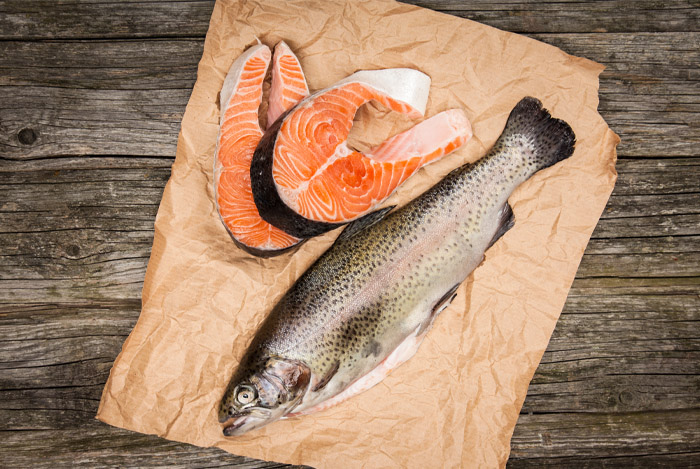
As if you need another reason to love super healthy fatty fish (hello, shiny hair!), studies have now shown that omegas can also lower anxiety levels.
When students from one study at Ohio State University took omega-3 fatty acid supplements, they reported a 20% decrease in anxiety versus those on the placebo. That’s because omega-3s decrease inflammation, which means stress hormones like adrenaline and cortisol don’t get out of hand and cause trouble for your mental clarity.
It’s better to get your omegas from a diet packed with these omega-rich foods rather than a supplement:
- Wild salmon
- Sardines
- Mackerel
- Anchovy
- Tuna
Avocado
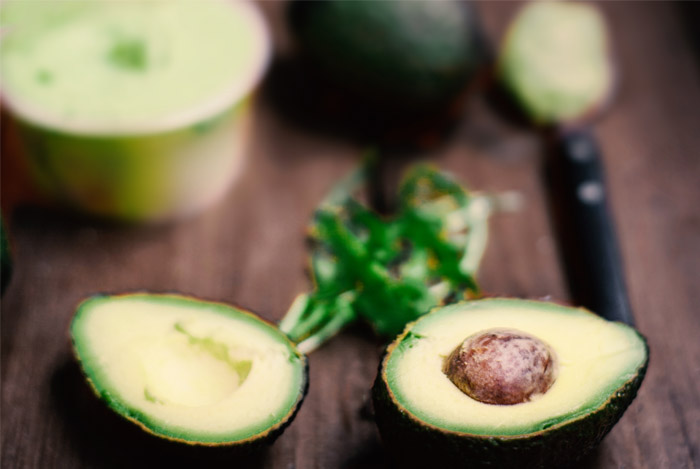
Another one of my favorite foods, avocado helps you out three ways. According to Men’s Fitness, avocados have B vitamins that relieve stress, plus lots of monounsaturated fat and potassium to lower your skyrocketing blood pressure during stressful periods.
Probiotics
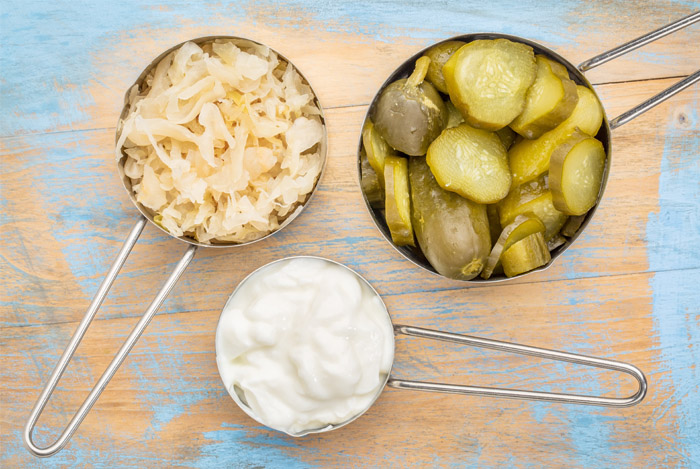
We talked before about your body’s incredible response to taking probiotics, so now let’s talk about how your brain’s going to feel when you take them.
Your gut is widely considered your “second brain” because it’s responsible for so much of your general health. For example, did you know that 95% of your “feel good” hormone serotonin lives in your belly? So, happy gut, happy life?
Researchers from one university study discovered that altering gut bacteria in mice also modified their moods. Mice were fed probiotic bacterium during Javier Bravo’s study at University College Cork and it reduced their behavior “associated with stress, anxiety, and depression.”
While you can take probiotic supplements, consider taking probiotics found naturally in:
- Kefir, yogurt
- Miso
- Sauerkraut
- Kombucha
- Kimchi
Tryptophan
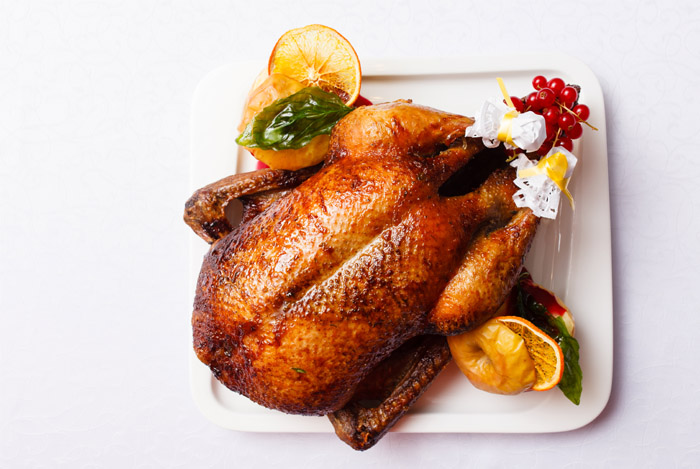
There’s a reason you’re so relaxed and sleepy after Thanksgiving dinner—and it’s not just because you’re about to enter a food coma. Turkey is well-known for containing the amino acid tryptophan.
“Tryptophan is a precursor to serotonin, and serotonin, a neurotransmitter, helps you feel calm,” says San Francisco nutritionist Manuel Villacorta, MS, RD.
Chamomile and Green Tea
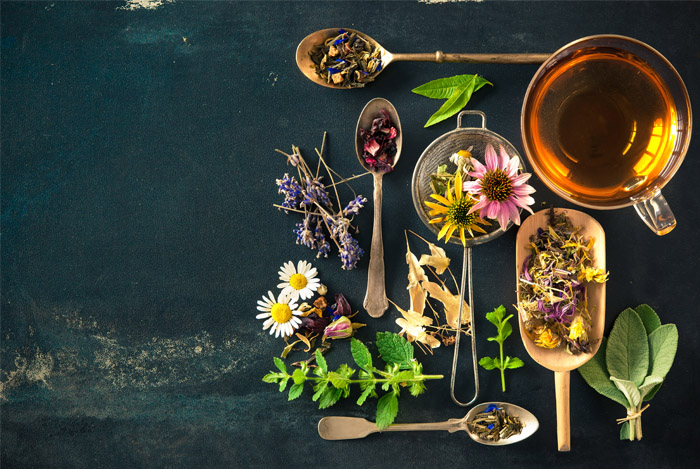
Chamomile tea has been used to chill people out since ancient Egyptian times.
Not only does chamomile help relax your body so can fall asleep, it even helps fight off mild depression, which so often coincides with anxiety. One study shed light on the fact that chamomile extract has “modest” effects on generalized anxiety, thanks to its calming herbal qualities.
If you don’t already know about the amazing health benefits of green tea, let me just summarize them for you: green tea is literally the healthiest drink in the world. It’s also full of the amino acid L-theanine, which “has been studied for its calming effects on the nervous system.”
The researchers in one of those studies learned that when highly anxious students took 200 milligrams of L-theanine before a test, they were calmer, had lower heart rates, and improved attention and reaction time.
Besides all the health benefits of chamomile and green tea, two studies have shown that “even mild dehydration can alter a person’s mood, energy level, and ability to think clearly.” If you find yourself constantly stressed and anxious, start adding more water (and tea!) to your regime and you’ll definitely notice a difference.
Turmeric
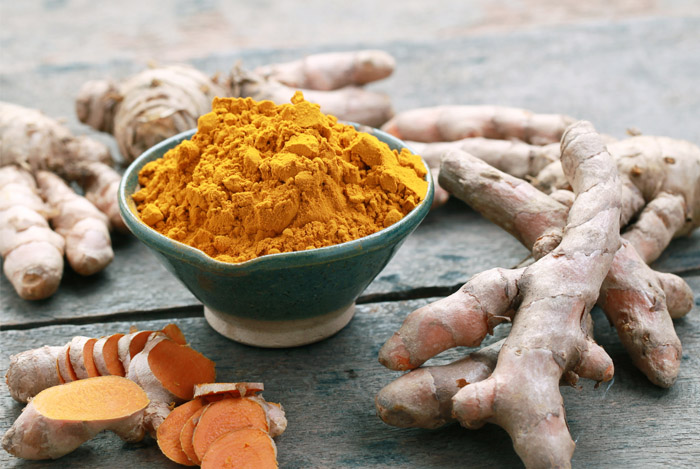
Turmeric’s known in the nutrition world as a powerful anti-inflammatory. We know that keeping inflammation down is not only good for the body, but also helps control stress hormones in the brain.
After studying turmeric’s effects on the brain, Adrian Lopresti, PhD, discovered that Curcumin, an extract of turmeric, has “positive antidepressant and antianxiety effects” which are “likely due to its ability to normalize specific physiological pathways.”
Lopresti adds that Curcumin also “appears to elevate neurotransmitters such as serotonin, while lowering stress hormones, such as cortisol.” More feel good hormones and less stress and anxiety? Sounds like a win to me.
If you’d like to learn more about this super spice, check out these other 12 amazing health benefits of turmeric today.
Dark Chocolate

Eating chocolate has positive effects on the brain; it can induce feelings of euphoria and love, which is why it’s synonymous with Valentine’s Day.
But not all chocolate is created equal. Dark chocolate is the healthiest because it lacks the added milk and sugar that milk or white chocolate have. It’s also helpful for reducing that stress hormone cortisol so your moods are steady.
When participants were given a daily dark chocolate drink equivalent to 1.5 ounces of chocolate every day during one study, they felt calmer than those participants who did not have the drink. I’d be pretty upset if I didn’t get a dark chocolate drink either.
Oysters

If your diet’s heavy on grains and beans and you’re feeling anxious or stressed, you may have a zinc deficiency. The phytic acid found in these foods actually binds to zinc and blocks it from being absorbed by your body.
As research has correlated, when zinc is out of balance with copper in your body, there is a higher rate for depression and anxiety. This trace mineral ratio ensures that your body can handle everyday stress by making sure your neurotransmitters function correctly.
If you’re looking for more zinc, look no further than cooked oysters, which come in at 220% DV (33 mg zinc) per half dozen.
Magnesium
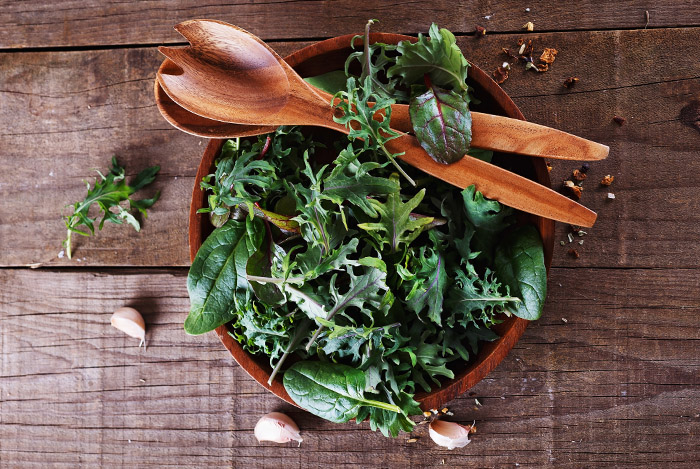
Magnesium is affectionately known as the “original chill pill” because it’s a “calming mineral that nourishes the nervous system and helps prevent anxiety, fear, nervousness, restlessness and irritability.”
Unfortunately, a surprisingly high number of us lack this essential mineral in our diets. Bad news for us: magnesium deficiency is typically correlated with anxiety.
An article in Psychology Today explains that magnesium used to be common in whole grains:
“Average American intake [of magnesium] in 1905 was 400mg daily, and only 1% of Americans had depression prior to the age of 75. In 1955, white bread (nearly devoid of magnesium) was the norm, and 6% of Americans had depression before the age of 24.”
You can bet those numbers have risen immensely in our present day thanks to modern day grain refining. While some argue that whole grains still have enough magnesium and tryptophan to raise serotonin levels, these results have only been seen in animal trials.
What’s a better source of magnesium?
One cup of cooked dark leafy greens such as:
- Spinach: 157 mg (39% DV)
- Swiss chard: 150 mg (28% DV)
- Kale: 23.4 mg (19% DV)
Or half a cup of nuts and seeds:
- Pumpkin seeds: 606 mg (150% DV)
- Cashews: 328 mg (63% DV)
- Sesame seeds: 253 mg (48% DV)
- Pine nuts: 169.5 mg (43% DV)
Seaweed, one of those incredibly healthy foods we should be eating, but don’t, is high in magnesium and tryptophan.
If you’re having a super stressful day and the very thought of going to the grocery store to pick up magnesium-rich foods makes you tense up, there’s another way to get the magnesium you need to relax:
Add a cup of Epsom salts to your bath water (and some lavender, mint, or eucalyptus!) and you’ll be absorbing magnesium through your skin as you take a calming soak and watch all your troubles swirl down the drain.
B Vitamins
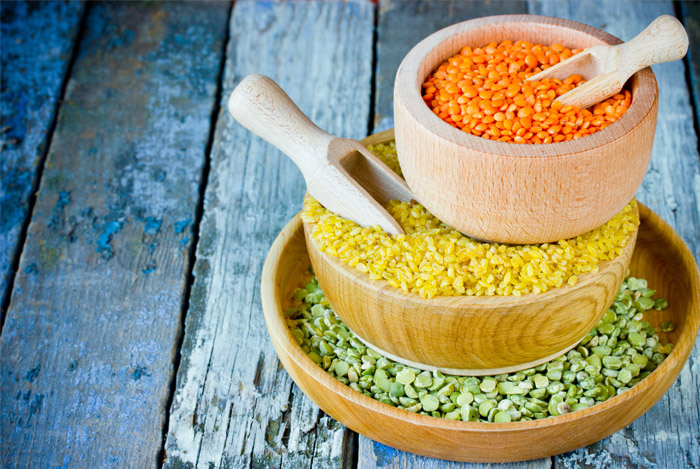
Being deficient in several B vitamins has been shown to negatively impair the brain and lead to “higher levels of anxiety, confusion, irritability, and depression.” B vitamins help the brain produce neurotransmitters such as serotonin and dopamine to keep you floating on happiness instead of stress.
Look for B vitamins in eggs, pork, sunflower seeds, pistachios, beans, lentils, shellfish, and asparagus. Just one cup of cooked asparagus contains over 60% of your DV of folic acid (B9), which has been linked to maintaining serotonin levels. Low levels of folic acid have been connected to neurotransmitter impairment, anxiety, and depression.
Final Takeaway
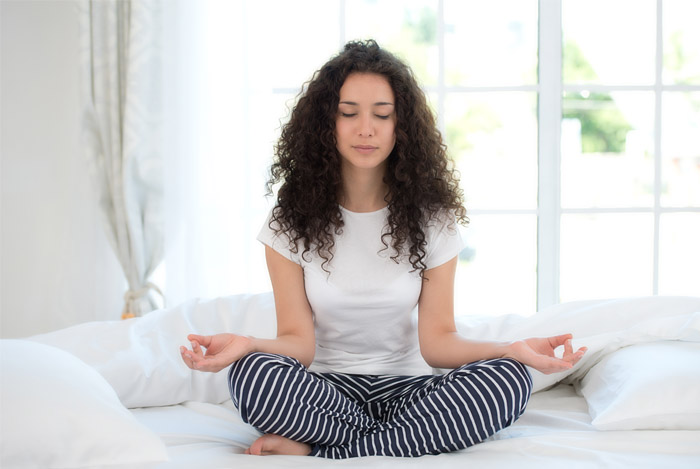
Before turning to prescriptions to calm your anxious mind and give you a break from your stress, start taking better care of yourself from the inside. Take a few minutes to meditate before your day even begins. Find a new yoga class you’ll actually stick with this time. And embrace the power of healing foods for your body and mind.
What do you do when you’re super stressed and anxious? Share your best chill out tips with me in the comments!
The post How Your Diet Can Prevent Stress and Anxiety appeared first on Nutrition Secrets.
http://www.nutritionsecrets.com/how-your-diet-can-prevent-stress-and-anxiety/
No comments:
Post a Comment